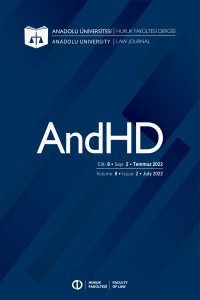Küresel Çerçeve Sözleşmelerin Sendikal Haklara Etkisi Bakımından İncelenmesi
Küresel Çerçeve Sözleşme, Uluslararası İşçi Federasyonu, Uluslararası Şirket, Sendikal Hak, Uluslararası Çerçeve Sözleşme
Examining the Effect of Global Framework Agreements on the Trade Union Rights
Global Framework Agreement, International Workers’ Federation, Transnational Company, Trade Union Rights, International Framework Agreement,
___
- Cesar F. Rosado Marzan, Organizing with international framework agreements: An exploratory study, UC Irvine Law Review, C. 4, S. 2, 2014
- Dimitris Stevis, International framework agreements and global social dialogue: Parameters and prospects, Geneva: ILO, 2010
- Felix Hadwiger, Global framework agreements: Achieving decent work in global supply chains?, International Journal of Labour Research, 2015, S. 7
- Gülten Kutal, Çok Uluslu Şirketlerin İşçi-İşveren İlişkilerine Etkisi, Sosyal Siyaset Konferansları Dergisi, 2012, S. 31
- Harry C. Katz/ Thomas A. Kochan/ Alexander Colvin, Global Pressures: Multinational Corporations, International Unionism, and NGO., Ithaca NY, ILR Press, 2015
- Jesper Nilsson, A tool for achieving workers’ rights, Metal World, S.4, 2002
- Jörg Sydov/ Michael Fichter/ Markus Helfen/ Kadire Zeynep Sayım, Implementation of Global Framework Agreements, Transfer: European Review Of Labour And Research, 2014, C. 20, S. 4
- Michael Fichter/ Dimitris Stevis, Global Framework Agreements in a Union-Hostile Environment: The Case of the USA, 2013, Erişim: SSRN 2383825
- Michael Fichter/ Jörg Sydow, Organization and Regulation of Employment Relations in Transnational Supply and Production Networks: Ensuring Core Labor Standards through International Framework Agreements?, Berlin, Institute of Political Science & Institute of Management, Freie Universitaet, 2008
- Michael Fichter/Markus Helfen, Shaping Global Industrial Relations. The Impact of International Framework Agreements, (Ed) Konstantinos Papadakis, Houndsmills: Palgrave Macmillan
- Neil M. Coe/ Peter Dicken/ Martin Hess, (2008). Global Production Networks: Realizing the Potential, Journal of Economic Geography, 2008, C.8, S.3
- Peter J. Buckley/ Francisco B. Castro. The investment development path: the case of Portugal, Transnational Corporations, 1998, S. 7
- Peter Wilke/ Kim Schutze, Background Paper on International Framework Agreements for a Meeting of the Restructuring Forum Devoted to Transational Agreemnts at Company Level, Hamburg, 2008,
- Petrol-İş Sendikası, KÇS Stratejik Bir Araç, İstanbul, Petrol-İş Dış İlişkiler Servisi, 2014
- Torsten Müller/Hans-Wolfgang Platzer/ Stefhan Rüb, International Framework Agreement: Opportunities and Limitations of a New Tool of Global Trade Union Policy, 2008, S. 8
- Volker Telljohann/ Isabel Da Costa/ Torsten Müller/ Udo Rehfeldt/ Reingard Zimmer, European and international framework agreements: Practical experiences and strategic approaches, Luxembourg: Office for Official Publications of the European Communities, 2009
- http://column.global-labour-university.org/ 15.08.2019
- http://pasoc.innopas.eu/fileadmin/docs/Pasoc2/Praxishilfe/EN_IFA-Praxishilfe.pdf, 15.08.2019.
- https://www.aeon.info/export/sites/default/common/images/en/pressroom/imgsrc/141110R_3.pdf, 19.08.2019.
- https://www.vinci.com/commun/communiques.nsf/04438CA8C4A62422C12581DF00384D96/$file/Accord-cadre-En.pdf, 23.08.2019
- Yayın Aralığı: 2
- Başlangıç: 2015
- Yayıncı: ANADOLU ÜNİVERSİTESİREKTÖRLÜĞÜ
İdari Yargıda İstinaf Kanun Yolu Aşamasında Verilen Gönderme Kararları Üzerine Bir İnceleme
Esas Sözleşme Değişikliklerinde Toplantı ve Karar Yeter Sayıları
Tüketicilerle Yapılan Abonelik Sözleşmelerinin Sözleşme Özgürlüğü İlkesi Bakımından İncelenmesi
“Lex Sempronia Tiberiana”: Tiberius Gracchus’un Toprak Reformu ve Toplumsal Kökenleri
Velayet Hakkının Kullanılması, Velayetin Değiştirilmesi
Küresel Çerçeve Sözleşmelerin Sendikal Haklara Etkisi Bakımından İncelenmesi
Tarım Arazilerinin Satılması Halinde Sınırdaş Maliklerinin Önalım Hakkı
